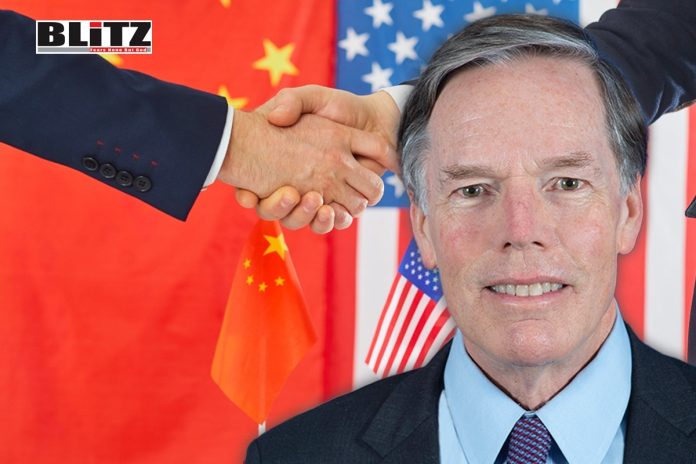US Ambassador to China Nicholas Burns made a candid statement on CBS’s “60 Minutes”, addressing those advocating for ending the economic ties with China. He warned that such a move could jeopardize the livelihoods of 750,000 American families. This remark underscores the significance of the bilateral trade relationship between the two nations. It’s rare to encounter such frankness in US political discourse, reflecting the nuanced and often distorted views on China within American public opinion. Despite its reserved nature, Burns’ statement has drawn significant attention, highlighting the complexities and implications of the US-China relationship in the global economy.
Nicholas Burns’ recent remarks stand out for their relative objectivity amidst past smear campaigns against China. However, it’s plausible that as the current US ambassador to China, Burns strategically utilizes interviews like this to amplify the Biden administration’s policy successes. This could aim to garner domestic support by portraying Biden’s China strategy as beneficial for the US while countering more extreme anti-China sentiments. Despite Burns’ acknowledgment of the complexities in US-China relations, his discourse consistently emphasizes managing the relationship within the framework of US leadership. This approach falls short of advocating for a more just, equitable, and mutually beneficial global order. Hence, while recognizing Burns’ nuanced perspective, it’s crucial to approach his words with a critical lens, considering their potential political motivations and limited global outlook.
The US maintains its stance of regarding China as a “strategic competitor” and continues to pursue a policy of “invest, align, and compete” with regards to China. This was evident in Burns’ comments during the CBS interview, where he highlighted China’s aspirations to surpass the US globally and the competitive dynamics between their militaries. China’s economic growth, technological advancements, and its ambition for a greater global role are often mischaracterized as attempts at global hegemony, reflecting Washington’s own hegemonic mindset. Consequently, US public opinion, influenced by such narratives, fluctuates between hyping the “China peak” theory and emphasizing the “China threat.” This underscores the persistent influence of hegemonic thinking in shaping perceptions of the US-China relationship.
During CBS’s visit to Beijing, an intriguing discovery was made regarding American firms operating in China. The program team found that many declined to grant interviews to 60 Minutes, even off the record. This reluctance stemmed from concerns about potential backlash in the US, particularly from lawmakers advocating for tougher policies on China. Such caution reflects the prevailing atmosphere of uncertainty surrounding China, prompting American enterprises in the country to adopt a guarded approach.
Nicholas Burns has served as the US ambassador to China for nearly two years, stepping into the role during a 17-month vacancy at what he described as the lowest point in China-US relations since 1972. His tenure commenced amidst significant challenges, akin to navigating a crisis.
However, despite his reputation for professionalism and rationality, Burns’ performance appears to mirror Washington’s stance and actions towards China, lacking the proactive engagement expected of an ambassador in such critical bilateral relations. As Burns continues his tenure, there remains hope that he, along with other influential figures in US politics, will work towards fostering mutual understanding and cooperation between the two nations.
Throughout his time in China, Burns has extensively engaged with various sectors of Chinese society, deepening his understanding of the country’s true situation. As such, he bears the responsibility to harness this insight into positive energy to steer China-US relations back onto a healthy trajectory, by advocating for greater transparency and truthfulness in discussions about the bilateral relationship. Given Burns’ repeated calls for peaceful coexistence between China and the US, it is hoped that he, alongside other influential members of the US political elite, will contribute earnestly towards achieving this common goal.




